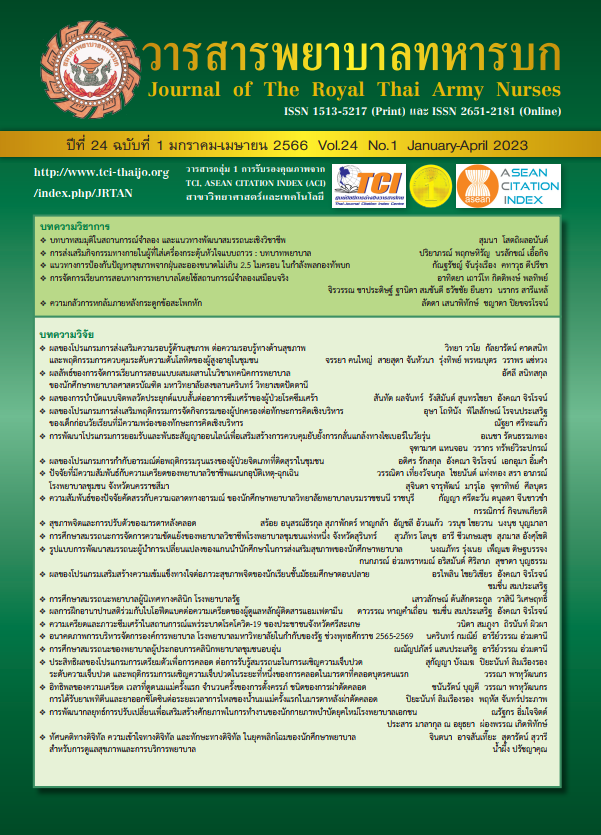Competencies of Thai Nurse Instructors in the Next Decade (A.D. 2023-2032)
Keywords:
Competency, Nurse instructor, Next decade (a.d. 2023- 2032)Abstract
This research aimed to study the competencies of Thai nurse instructors in the next decade (A.D. 2023–2032). It was based on future research using the Delphi technique, from the collection of opinions of 17 nursing instructors and professional nurses with knowledge and experience. They were divided into six nursing instructors from Rajabhat University, five nursing instructors from other affiliates, three nursing administrators, and three professional nurses. The research process consisted of three steps: Step 1: Interview experts. Using a semi-structured questionnaire, the second step was to analyze the content data and construct a questionnaire to allow experts to comment on the importance of the sub-component nurse competency. Step 3: Use expert opinions to calculate the median and interquartile ranges, and then reconfirm the opinions with the experts. The data was then computed for the median and interquartile ranges to draw conclusions from the research.
The results showed the competencies of Thai nurses in the next decade (A.D. 2023–2032) consisted of 3 components and 41 sub-components, namely: 1) 15 attributes, 2) 10 soft skills, and 3) hard skills. There were 16 items of hard skills and competence. It was found that all items had a median of 4.00 or higher, and the group of experts had the same opinion. The interquartile range was not more than 1.00, and the data was changed by 5.87%. The results of this research can be used by the administrators of nursing institutions to formulate policies and provide training to develop nursing instructors to have such competencies.
Downloads
References
Brower E, Nemec R, Ritchie H, Nicastro O. A qualitative exploration of self-identity during the role transition to a nurse educator. Nurse Education Today. 2022; 112(2022): 105331.
Crider C. Pedagogical content knowledge for nurse educators: an intersection of disciplines. Teaching and Learning in Nursing. 2022; 17(3): 1-6.
Sebach AM. Psychometric testing of a tool assessing nurse practitioner clinical educator competence. The Journal for Nurse Practitioners. 2022; 18(2022): 217-20.
Summers JA. Developing competencies in the novice nurse educator: an integrative review. Teaching and Learning in Nursing. 2017; 12(4): 263-76.
Bence AF, Coetzee SK, Klopper HC, Ellis SM. The association between the practice environment and selected nurse educator outcomes in public nursing education institutions: a cross-sectional study. Nurse Education in Practice. 2022; 58(2022): 103261.
Buachu T, Phutiariyawat J, Wichitputchraporn W. Exploratory factor analysis: a component of competency for improving competitiveness in the 21st century of the Rajabhat University’s nursing instructors. Journal of The Police Nurses. 2021; 13(1):123-35. (in Thai).
Bristol T, Hagler D, Bohler JM, Wermers R, Hatch D, Oermann MH. Nurse educators’ use of lecture and active learning. Teaching and Learning in Nursing. 2019; 14(2): 94-6.
Eycan O, Ulupinar S. Nurse instructors’ perception towards distance education during the pandemic. Nurse Education Today. 2021; 107(2021): 105102.
Hababeh MO, Lalithabai DS. Nurse trainees’ perception of effective clinical instructor characteristics. International Journal of Nursing Sciences. 2020; 7(2020): 285-90.
Leighton K, McNelis A, Edgren SK. The competency of clinical nurse educators. Journal of Professional Nursing. 2022; 43(2022): 1-4.
Widiyaningsih T, Yetti K, Kuntarti K. The competency of clinical instructors as it relates to the caring behavior of new nurses. Enfermeria Clinica. 2019; 29(Supplement): 815-19.
Mella AJ. An integrative literature review on selecting patient assignments for undergraduate nursing students in the clinical setting. Nurse Education Today. 2021; 107(2021): 105103.
Srisatidnarakul B. The methodology in nursing research. Bangkok: U&I Inter Media Co., Ltd; 2010. (in Thai).
Linestone HA, Turoff M. The delphi method, techniques and application. Massachusetts: Addison-Wesky Publishing; 1975.
Sanpayao K, Totest I, Wongwatthanaphong K. Skills needed by government workers in the future world. Journal of Administration and Social Science Review. 2022; 5(3): 131-40.
Buachu T, Sirirat N, Muangkaew P. The scenario of nursing curriculum in the next decade (a.d. 2020-2029), Rajabhat University in Thailand. Journal of The Police Nurses. 2020; 12(2): 301-10. (in Thai).
Saraketrin A, Rongmuang D, Chantra R. Nursing education in the 21st century: competencies and roles of nursing instructors. Journal of The Royal Thai Army Nurses. 2019; 20(1): 12-20. (in Thai).
Cayir A, Ulupinar S. The relationship among educational skills, general self-efficacy perceptions and performance in nursing instructors. Nurse Education Today. 2021; 107(2021): 105129.
Ye J, Tao W, Yang L, Xu Y, Zhou N, Wang J. Developing core competencies for clinical nurse educators: an e-delphi-study. Nurse Education Today. 2022; 109(2022): 105217.
Buachu T, Sirirat N, Noimorkunladech N, Muangkaew P. Disruptive change in nursing education: from the situation of the spread of the coronavirus disease 2019 to online learning. Journal of The Royal Thai Army Nurses. 2021; 22(2): 1-9. (in Thai).
Buachu T. A study of the opinion of teaching and learning models of undergraduate nursing curriculum, Phetchaburi Rajabhat University in the 21st century. Journal of Nursing Science Chulalongkorn University. 2018; 30(3): 26-37. (in Thai).
Buachu T, Soiphet N, Muangkaew P, Chomphunit P, Chayathab S. Transformative learning: apply to nursing administration and management subject. Journal of The Royal Thai Army Nurses. 2020; 21(3): 20-8. (in Thai).
Downloads
Published
How to Cite
Issue
Section
License
Copyright (c) 2023 Journal of The Royal Thai Army Nurses

This work is licensed under a Creative Commons Attribution-NonCommercial-NoDerivatives 4.0 International License.
บทความหรือข้อคิดเห็นใดใดที่ปรากฏในวารสารพยาบาลทหารบกเป็นวรรณกรรมของผู้เขียน ซึ่งบรรณาธิการหรือสมาคมพยาบาลทหารบก ไม่จำเป็นต้องเห็นด้วย
บทความที่ได้รับการตีพิมพ์เป็นลิขสิทธิ์ของวารสารพยาบาลทหารบก
The ideas and opinions expressed in the Journal of The Royal Thai Army Nurses are those of the authors and not necessarily those
of the editor or Royal Thai Army Nurses Association.






